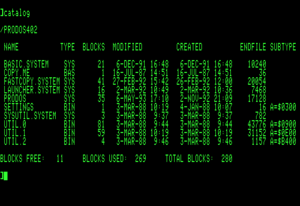Apple ProDOS

A floppy disk catalog in ProDOS 8 v2.0.3
|
|
| Developer | Apple Computer |
|---|---|
| OS family | SOS |
| Working state | Discontinued |
| Source model | Closed source |
| Initial release | October 1983 |
| Latest release | 2.0.3 / May 6, 1993 |
| Available in | English |
| Platforms | Apple II series of personal computers |
| Kernel type | Monolithic kernel |
| Default user interface | primarily text user interface |
| License | Apple Software License Agreement |

ProDOS 16 v1.6 - running an earlier version of the Apple IIGS Finder
|
|
| Developer | Apple Computer |
|---|---|
| OS family | SOS |
| Working state | Discontinued |
| Source model | Closed source |
| Initial release | September 1986 |
| Latest release | 1.6 / June 14, 1988 |
| Available in | English |
| Platforms | Apple IIGS |
| Kernel type | Monolithic kernel |
| License | Apple Software License Agreement |
ProDOS is the name of two similar operating systems for the Apple II series of personal computers. The original ProDOS, renamed ProDOS 8 in version 1.2, is the last official operating system usable by all 8-bit Apple II series computers, and was distributed from 1983 to 1993. The other, ProDOS 16, was a stop-gap solution for the 16-bit Apple IIGS that was replaced by GS/OS within two years.
ProDOS was marketed by Apple as meaning Professional Disk Operating System, and became the most popular operating system for the Apple II series of computers 10 months after its release in January 1983.
ProDOS was released to address shortcomings in the earlier Apple operating system (called simply DOS), which was beginning to show its age.
Apple DOS only has built-in support for 5.25" floppy disks and requires patches to use peripheral devices such as hard disk drives and non-Disk-II floppy disk drives, including 3.5" floppy drives. ProDOS adds a standard method of accessing ROM-based drivers on expansion cards for disk devices, expands the maximum volume size from about 400 kilobytes to 32 megabytes, introduces support for hierarchical subdirectories (a vital feature for organizing a hard disk's storage space), and supports RAM disks on machines with 128kB or more of memory. ProDOS addresses problems with handling hardware interrupts, and includes a well-defined and documented programming and expansion interface, which Apple DOS had always lacked. Although ProDOS also includes support for a real-time clock (RTC), this support went largely unused until the release of the Apple IIGS, the first in the Apple II series to include an RTC on board. Third-party clocks were available for the II Plus, IIe, and IIc, however.
...
Wikipedia
